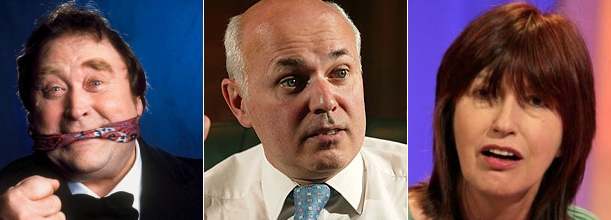Top 3 Biopics that never got made

Back in the early days of Hollywood, the biopics was the genre of choice for producers looking to rake in an audience. The targets for these films were so-called ‘idols of production’ – people like Marie Curie, Louis Pasteur and Thomas Edison (who had two separate biopics – 1939’s Young Tom Edison and 1940’s Edison The Man – released a year apart).
However, in the post-war boom years things began to change. People in the West became more affluent and this was reflected in biopic production, with the focus shifting from ‘idols of production’ to ‘idols of consumption’. Now the stars of biopics were people who are essentially commercial products and whose consumption the audience can vicariously enjoy, often luminaries from the world of entertainment or sports – see The Jackie Robinson Story, or even The Pride of the Yankees.
Nowadays celebrity culture is more rife than ever. Scarily enough, reality television is garnering a kind of self-perpetuating force, with the threat of biopics being made about people who rose to notoriety through reality TV shows. News has cooled on the threat of the Jade Goody film Catch A Falling Star, but it seems like a Susan Boyle movie will eventually get made, with Glenn Close reported to be taking on the role.
Still, until these films get put into production, perhaps there is still hope for the future of a genre that has brought us real masterpieces such as Raging Bull, Gandhi and The Elephant Man…
Star: Bernard Manning – Played By: Alec Baldwin

Actual Life Story:
Bernard Manning was born into a working class family in Manchester and lived in the same area for all of his life. At 16 he was drafted into the British Army and worked as a guard in Spandau Prison, which housed some of the former Nazi high command in the post-war years. Upon his return Manning rose to fame as a music hall singer and was even booked to play at the Lyceum Theatre in London, a gig that was ultimately cancelled as it fell on the same day as the death of King George VI. Manning eventually changed tack and ended up forging a stand-up comedy career during which he became the scourge of mothers-in-law, ethnic minorities and sensible non-racists up and down the country. Died in 2007 at the ripe old age of 76.

Dramatised Story:
It was a dark time for Britain. The threat of Nazi Germany loomed like the sword of Damocles over Blighty. Even after the war ended, public opinion was turning against Winston Churchill after reports emerged that the Nazi elite in Spandau Prison were having, according to Rudolf Hess, “a whale of a time”. Only one man could steer Britain on a course for prosperity – that man was Bernard Manning. Drafted into the army to sort shit out, Manning single handedly killed every Nazi in Spandau Prison with his bare hands. He then returned to Britain a hero. So loved was he that the news that he had to cancel a singing appearance at The Lyceum Theatre in London was enough to kill the guts out of King George VI. Manning took this as a sign and instead turned his hand to stand-up comedy, taking the profession by storm and even performing at the MGM Grand in Las Vegas (where he reportedly “couldn’t get a good bitter for love nor money”). Manning died at the age of 76, and a state funeral was held in his honour.
Star: Iain Duncan Smith – Played By: Ross Kemp

Actual Story:
The son of a highly decorated war veteran and a ballerina, Iain Duncan Smith had a comfortable upbringing, attending the prestigious naval college HMS Conway (where he reputedly played rugby in the same team as Clive Woodward) before attending the Royal Military Academy at Sandhurst. Smith joined the Conservative party in 1981, and in 1992 was elected to Parliament as the MP for Chingford. He rose through the ranks, clashed with John Major over Europe, and was eventually elected Party Leader – as Thatcher’s preferred candidate, no less – when William Hague resigned in 2001. However, Smith’s leadership was marred by discontent from back-benchers, and eventually resigned after losing a vote of no confidence. He is now Secretary of State for Work and Pensions in the Con-Dem government.

Dramatised Story:
The navy had never seen anyone like him. With his ripped abs, trembling biceps and shiny, shiny head, Iain Duncan Smith was fast-tracked through the highest military academies, groomed for a career serving his country. But he chucked that in to serve on a different front: the front line of politics. After a steamy night with then leader of the Conservative party Margaret Thatcher, Smith joined the Tories and began his meteoric rise to the top. Of course there were opponents; every great man has to deal with his share of naysayers. It was reported that Smith fought constantly with John Major during the 90s due to their differing opinion over Europe – Major apparently had visited Paris once and said it was “quite nice if a little expensive”, but Smith knew better, saying that Europe “stank of shit and anyway don’t they eat snails?”. Always an underdog, Smith sadly couldn’t fight hard enough against Major’s disciples when they unjustly forced him to step down as leader of the party in 2003, after two glorious years of leadership. Never one to give up easily though, Smith is now a high-ranking member of David Cameron and Nick Clegg’s coalition government, with his eye on the top prize once again.
Star: Janet Street Porter – Played By: Anne Hathaway

Actual Story:
Janet Street Porter, neé Bull, grew up in Fulham, West London in a working class family, the daughter of an electrician and a dinner-lady. After dropping out of architectural college she entered a career in media, becoming deputy fashion editor of the Daily Mail in 1969, and then fashion editor of the Evening Standard in 1971. She then entered the world of television as a presenter and producer, notably commissioning Red Dwarf. Her cockney drawl and acid tongue didn’t always make her the most endearing character, and yet she has been constantly on our screens throughout her career, most recently as a regular reporter for Gordon Ramsay’s The F Word. Nowadays she is the editor-at-large for the Independent on Sunday.

Dramatised Story:
From the moment she was born, Janet Street Porter knew she was going to be a star; she broke out of the grimy streets and jellied eel houses of Parsons Green, blazing a trail in the world of fashion journalism. As Deputy Fashion Editor of the Daily Mail she famously declared that red was “in”, only to perform a dramatic U-turn as Fashion Editor of the Evening Standard the following year by saying that red was “out”. These trademark changes of heart were regular occurrences for Street Porter, her pragmatism being both a blessing and a curse. She got into TV in the early 90s as a presenter, but was swiftly moved behind the camera by forces beyond her control for apparently being “too real”. The remainder of the decade was a constant power struggle between Street Porter and the bigwig television execs who ran the UK media, with things eventually coming to a head when she apparently bit Greg Dyke’s face off. But, when everyone else turned against her, a white-haired angel gave her a chance… The angel in question? Gordon Ramsay. Street Porter found a new audience, taking her hard-hitting journalistic eye to the world of free range chicken farming.





Recent Comments